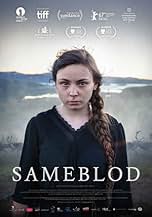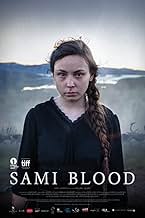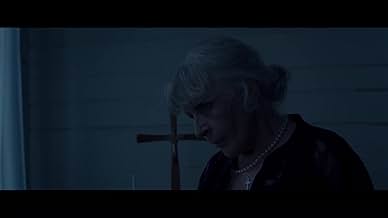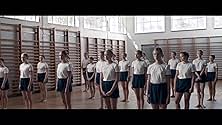IMDb RATING
7.3/10
8.6K
YOUR RATING
A reindeer-breeding Sámi girl who is exposed to the racism of the 1930's at her boarding school, starts dreaming of another life. But to achieve it, she has to become someone else and break ... Read allA reindeer-breeding Sámi girl who is exposed to the racism of the 1930's at her boarding school, starts dreaming of another life. But to achieve it, she has to become someone else and break all ties with her family and culture.A reindeer-breeding Sámi girl who is exposed to the racism of the 1930's at her boarding school, starts dreaming of another life. But to achieve it, she has to become someone else and break all ties with her family and culture.
- Awards
- 26 wins & 18 nominations total
Maj-Doris Rimpi
- Elle Marja
- (as Maj Doris Rimpi)
- …
- Director
- Writer
- All cast & crew
- Production, box office & more at IMDbPro
Featured reviews
My Swedish teacher highly recommended me this Swedish film and I had always wanted to watched it. It was played during the Vancouver International Film Festival but I just missed it. Finally, I had an opportunity to watch it. The story of Scandinavian indigenous people in this film reminds of the Salish people in Canada. The indigenous people faced huge invasion in culture, education, territory, etc. They were regarded inferior. Especially young indigenous faced self- identity crisis. They were starting to lose themselves in this modern world. Fortunately, governments start to launch cultural project to rescue indigenous culture. But it is far from enough. Films on this topic are a good ways to let the public know about indigenous culture, language, history and stories.
I am so glad that Amazon carries foreign films like this -- although it takes some digging to find them.
The lead actress was flawless in her role as a native Lapp who is disdained by the Swedish elite. She plays this with such subtlety and dignity. I wanted to hug her and take her away from all the horrible treatment she received. The scenery is great. Hats off to the director for such a magnificent job. I always find that Nordic films are far and away better than American films. "The Hunt" was the most haunting Nordic film I've ever seen. Such a great film Thank you.
Guatemalan Indigenous Leader and Nobel Peace Prize winner Rigoberta Menchu Tum said, "We are not myths of the past, ruins in the jungle, or zoos. We are people and we want to be respected." Unfortunately, however, Indigenous people have been the subject of racism and discrimination throughout history. Massacres, forced-march relocation, the "Indian wars", death by starvation and disease form a depressing legacy of man's inhumanity to man. Inspired by the personal experience of director Amanda Kernell's grandmother, the deeply moving Sami Blood is about what Kernell has called an "untold" story and a "dark chapter" in Swedish history. She is referring to the oppression of the indigenous Samis, also known as Lapps, an indigenous people who live in the far northern areas of Norway, Sweden, Finland, and Russia.
Shot by cinematographers Sophia Olsson and Petrus Sjövik, the film is set in Sweden in the 1930s when the rising tide of nationalist fervor dominated Europe and led to the Nazi's embrace of Eugenics and the theory of the master race. Sami Blood opens in the present day, however, as ninety-year-old Christina (Maj Doris Rimpi) returns to Lapland with her son and granddaughter to attend the funeral of her estranged sister. Traditional yoik-singing does not prevent Christina from becoming morose and withdrawn, retreating to a hotel by herself. The film then flashes back eighty years to the time when Christina (Lene Cecilia Sparrok), then known as Elle-Marja, was a precocious 14-year-old girl living with her sister Njenna (Sparrok's own sister Mia Erika) and her recently widowed mother (Katarina Blind), engaged in reindeer herding.
As in the US and Canada where Native children were sent to residential schools where their language, religion and cultural beliefs were often the object of ridicule, the sisters are sent to a special boarding school where they learn the hard lesson that the world regards them as lesser human beings. The Sami girls are dismissed by local Swedish teens as "circus animals" and "filthy Lapps," and are subject at school to being measured and photographed to prove a physical basis for their inferiority. While singled out for her learning ability by her deceptively supportive teacher, Christina (Hanna Alstrom, "Kingsman: The Secret Service"), Elle-Marja's inquiries about becoming a teacher meets with the reply that Sami's have small brains and are not capable of functioning outside of their own community. "Studies have shown that your people can't get by in town you have to stay here or you'll die out," she says.
In spite of her humiliation, Elle-Marja is able to dream of a more productive future. It is a future, however, that will cause her to turn her back on her family and her heritage, a betrayal that will mark her entire life. In one scene, Elle Marja, who is trying to pass herself off as a "normal Swede," blurts out to her sister, "Get away, you filthy Lapp." When she meets Niklas (Julius Fleischlanderl, "Young Sophie Bell") a good-looking Swedish boy from Uppsala who does not know that she is Sami, her dreams of escaping from the school begin to become real. After her mother refuses to sell a reindeer in order to pay for the education Elle-Marja requires to become a teacher, she changes her name to Christina and pursues her relationship with Niklas.
Showing up at his upscale home, Christina untruthfully tells his mother that Niklas said that she could stay with them. In spite of their growing connection which includes staying overnight in his room, he does not defend her when his mother discovers her to be a Sami and she is asked to leave. She remains determined, however, to start a new life regardless of the barriers she faces. Though Sami Blood covers familiar ground, the pain caused by discrimination can never be routine. What elevates the film to a different level, however, is the quiet but fiercely determined performance of Lena Cecilia Sparrok as Elle-Marja/Christina. While the film is about oppression, it is not a polemic but a human document that transcends the limitations of its environment and makes a universal statement about the longing to fit in, the fear of isolation, and the conflict between the life we are born into and the one we choose for ourselves.
Shot by cinematographers Sophia Olsson and Petrus Sjövik, the film is set in Sweden in the 1930s when the rising tide of nationalist fervor dominated Europe and led to the Nazi's embrace of Eugenics and the theory of the master race. Sami Blood opens in the present day, however, as ninety-year-old Christina (Maj Doris Rimpi) returns to Lapland with her son and granddaughter to attend the funeral of her estranged sister. Traditional yoik-singing does not prevent Christina from becoming morose and withdrawn, retreating to a hotel by herself. The film then flashes back eighty years to the time when Christina (Lene Cecilia Sparrok), then known as Elle-Marja, was a precocious 14-year-old girl living with her sister Njenna (Sparrok's own sister Mia Erika) and her recently widowed mother (Katarina Blind), engaged in reindeer herding.
As in the US and Canada where Native children were sent to residential schools where their language, religion and cultural beliefs were often the object of ridicule, the sisters are sent to a special boarding school where they learn the hard lesson that the world regards them as lesser human beings. The Sami girls are dismissed by local Swedish teens as "circus animals" and "filthy Lapps," and are subject at school to being measured and photographed to prove a physical basis for their inferiority. While singled out for her learning ability by her deceptively supportive teacher, Christina (Hanna Alstrom, "Kingsman: The Secret Service"), Elle-Marja's inquiries about becoming a teacher meets with the reply that Sami's have small brains and are not capable of functioning outside of their own community. "Studies have shown that your people can't get by in town you have to stay here or you'll die out," she says.
In spite of her humiliation, Elle-Marja is able to dream of a more productive future. It is a future, however, that will cause her to turn her back on her family and her heritage, a betrayal that will mark her entire life. In one scene, Elle Marja, who is trying to pass herself off as a "normal Swede," blurts out to her sister, "Get away, you filthy Lapp." When she meets Niklas (Julius Fleischlanderl, "Young Sophie Bell") a good-looking Swedish boy from Uppsala who does not know that she is Sami, her dreams of escaping from the school begin to become real. After her mother refuses to sell a reindeer in order to pay for the education Elle-Marja requires to become a teacher, she changes her name to Christina and pursues her relationship with Niklas.
Showing up at his upscale home, Christina untruthfully tells his mother that Niklas said that she could stay with them. In spite of their growing connection which includes staying overnight in his room, he does not defend her when his mother discovers her to be a Sami and she is asked to leave. She remains determined, however, to start a new life regardless of the barriers she faces. Though Sami Blood covers familiar ground, the pain caused by discrimination can never be routine. What elevates the film to a different level, however, is the quiet but fiercely determined performance of Lena Cecilia Sparrok as Elle-Marja/Christina. While the film is about oppression, it is not a polemic but a human document that transcends the limitations of its environment and makes a universal statement about the longing to fit in, the fear of isolation, and the conflict between the life we are born into and the one we choose for ourselves.
Elle Marja, a native of Lapland, faces xenophobia, while suffering a social and cultural wash imposed by Sweden.
I believe that one of the factors that makes this film interesting is the way it explores the subject, in this case, xenophobia and racism, in a country considered by many to be an almost perfect example of modern societies, Sweden.
The story begins with Elle Marja, as a retired teacher, at her sister's funeral, and then takes us into a flashback, where both are young and start attending school.
The process of abandoning culture, the dialect and the mannerisms and gestures themselves is explored in a good way, it fits the time when the individual shapes his personality (adolescence), which allows us to perceive the attitudes that the character adopts throughout the story development.
The photography is very interesting, with that atmosphere of melancholy and loneliness typical of northern European films.
I believe that one of the factors that makes this film interesting is the way it explores the subject, in this case, xenophobia and racism, in a country considered by many to be an almost perfect example of modern societies, Sweden.
The story begins with Elle Marja, as a retired teacher, at her sister's funeral, and then takes us into a flashback, where both are young and start attending school.
The process of abandoning culture, the dialect and the mannerisms and gestures themselves is explored in a good way, it fits the time when the individual shapes his personality (adolescence), which allows us to perceive the attitudes that the character adopts throughout the story development.
The photography is very interesting, with that atmosphere of melancholy and loneliness typical of northern European films.
I really do like Scandinavian movies and as far as I can remember, there was never a movie from Scandinavia that ever disappointed me. But this movie took me by surprise... It has been 4 days since I've seen this movie at local art-club cinema and yet I still can't stop to think about it. Something changed in my heart and even I'm a very rationale human being, it is difficult to explain why did this movie affect me so deeply. Was it the perfect written story, a subtle story that grabbed me by the soul as how real was it portrayed ? Was it the amazing cinematography of the mysterious and tranquil landscape of Lapland ? Was it the well-balanced camera shots coupled with modest yet powerful and deep soundtrack ? Was it the perfect acting of those young and innocent Saami sisters and the strong bond between them ? Whatever it was, it left me with a powerful and profound feeling inside. And if a movie is capable of achieving exactly this, then it is definitely worth watching.
Did you know
- TriviaAll the Sámi characters are played by real life Sámi people.
- Quotes
Elle Marja: [to Njenna] Don't yoik at school...
- ConnectionsEdited from Stoerre Vaerie (2015)
- How long is Sami Blood?Powered by Alexa
Details
Box office
- Gross worldwide
- $442,416
- Runtime1 hour 50 minutes
- Color
- Aspect ratio
- 2.35 : 1
Contribute to this page
Suggest an edit or add missing content

Top Gap
By what name was Sami, une jeunesse en Laponie (2016) officially released in India in English?
Answer





















